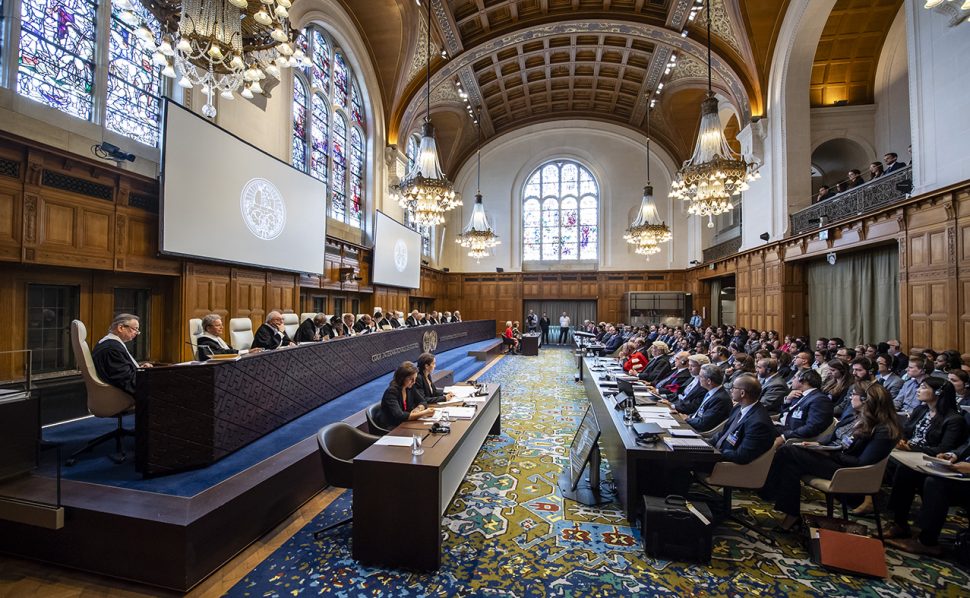
The ICJ courtroom (ICJ website)
July 3 2018
Following Venezuela’s rejection of proceedings at the International Court of Justice (ICJ) on its longstanding border controversy with Guyana, the ICJ says that written pleadings in the matter must first address the question of its jurisdiction and Guyana has up to November 19, 2018 to file its memorial.
According to a press release posted on its website yesterday, the ICJ, based in The Hague, Netherlands, said by an Order dated 19th June 2018 the Court fixed November 19, 2018 and April 18, 2019 as the respective time-limits for the entering of a memorial by Guyana and a counter-memorial by Venezuela.
After decades of the Good Offices process under UN auspices failed to resolve the border controversy, Guyana on March 29, 2018 filed an application with the ICJ requesting that it confirm the legal validity and binding effect of the 1899 arbitral award settling the boundaries between British Guiana and Venezuela.
As a result of Guyana’s application on March 29, the ICJ in early June announced that it would receive the Representatives of Venezuela and of Guyana, on June 18, 2018 in order to know the points of view of the parties regarding procedural issues in Georgetown’s move for a juridical settlement of the controversy.
It was at this meeting that Venezuela advised the ICJ that it would not be taking part in the process and did not recognize the court’s jurisdiction.
In its press release yesterday, the ICJ said that pursuant to Article 31 of the Rules of Court, its President, Judge Abdulqawi Ahmed Yusuf, met with representatives of the Parties, on 18 June 2018.
At this meeting, it said that Carl B. Greenidge, the Agent of Guyana, indicated that his Government wished to have at its disposal a period of nine months for the preparation of its Memorial. Guyana has however been given six months.
Delcy Rodríguez Gómez, Vice-President of Venezuela, stated, according to the press release that her Government “consider[ed] that the Court manifestly lack[ed] jurisdiction and that it ha[d] decided not to take part in the proceedings”. She handed to the President of the Court a letter, dated 18 June 2018, from Nicolás Maduro Moros, President of Venezuela, in which he pointed out, in particular, that “there [was] no basis for the jurisdiction of the Court” and that Venezuela “[would] not participate in the proceedings”.
In response to the statement of the Vice-President of Venezuela, the release said that the representatives of Guyana reiterated that their Government wished to proceed with the case.
In its Order of June 19th, the release yesterday said that the Court pointed out that, in the circumstances of the case, it must first settle the question of its jurisdiction and that “this question should accordingly be separately determined before any proceedings on the merits” of the matter filed by Guyana.
The release said that the Order notes that “the possibility for Venezuela of availing itself of its procedural rights as a Party to the case is preserved”.
In its Application of March 29 before the ICJ, Guyana requested that the Court adjudge and declare that:
“(a) The 1899 Award is valid and binding upon Guyana and Venezuela, and the boundary established by that Award and the 1905 Agreement is valid and binding upon Guyana and Venezuela;
(b) Guyana enjoys full sovereignty over the territory between the Essequibo River and the boundary established by the 1899 Award and the 1905 Agreement, and Venezuela enjoys full sovereignty over the territory west of that boundary; Guyana and Venezuela are under an obligation to fully respect each other’s sovereignty and territorial integrity in accordance with the boundary established by the 1899 Award and the 1905 Agreement;
(c) Venezuela shall immediately withdraw from and cease its occupation of the eastern half of the Island of Ankoko, and each and every other territory which is recognized as Guyana’s sovereign territory in accordance with the 1899 Award and 1905 Agreement;
(d) Venezuela shall refrain from threatening or using force against any person and/or company licensed by Guyana or engage in economic or commercial activity in Guyanese territory as determined by the 1899 Award and 1905 Agreement, or in any maritime areas appurtenant to such territory over which Guyana has sovereignty or exercises sovereign rights, and shall not interfere with any Guyanese or Guyanese-authorised activities in those areas;
(e) Venezuela is internationally responsible for violations of Guyana’s sovereignty and sovereign rights, and for all injuries suffered by Guyana as a consequence.”
On January 30th this year, United Nations Secretary-General, António Guterres recommended that the Guyana/Venezuela border controversy be referred to the ICJ which is also known as the World Court.
Following a request by Guyana for juridical settlement, former UN Secretary General Ban Ki-moon on December 15, 2016 had given the good offices process between the two countries one additional year – 2017 – for talks at settling the controversy and if there was no substantial progress the matter would then be sent to the ICJ. When it filed its case on March 29 at the ICJ, Guyana said that the UN Secretary-General’s authority to choose the ICJ as a means of resolving the controversy is based on the Geneva Agreement of 1966 which was negotiated just before Guyana gained independence.
The application was handed over to Registrar of the ICJ, Philippe Couvreur by Greenidge.
According to Greenidge, in filing its application, Guyana has respected the Secretary-General’s decision and placed its faith in the ICJ to “resolve the controversy in accordance with its Statute and jurisprudence, based on the fundamental principles of international law, including the sanctity of treaties, the maintenance of settled boundaries and respect for the sovereignty and territorial integrity of States”.
